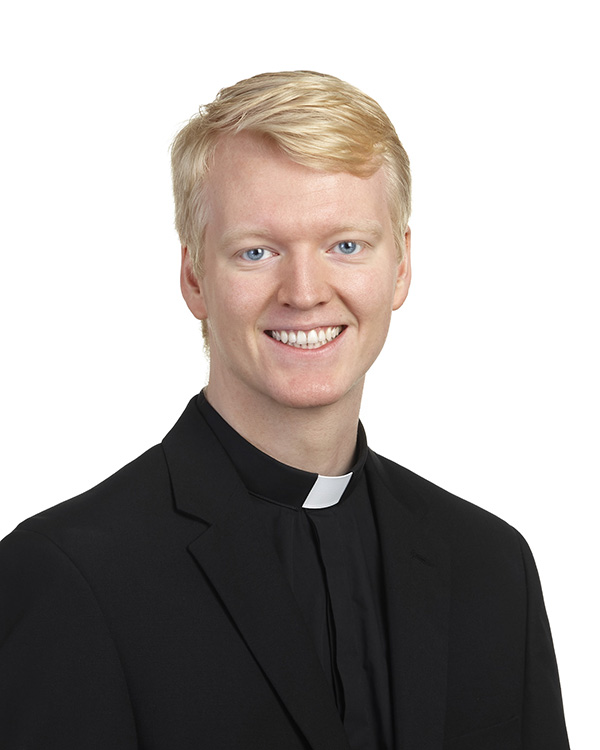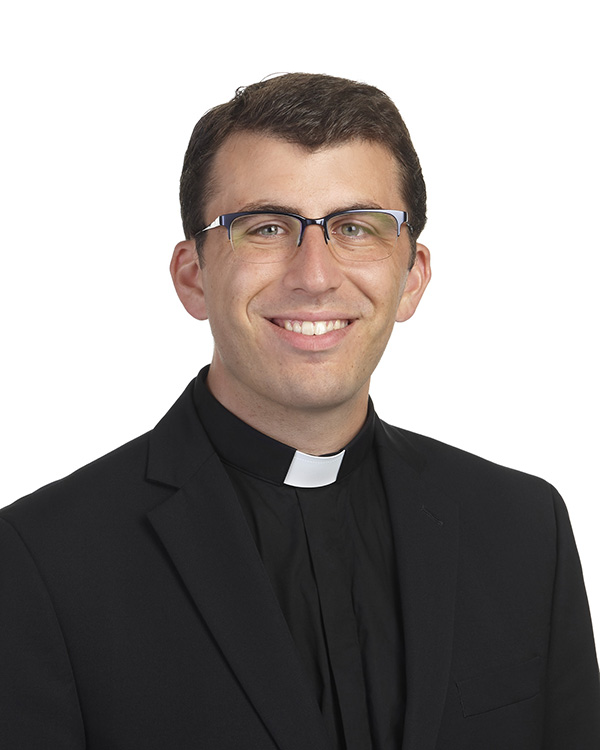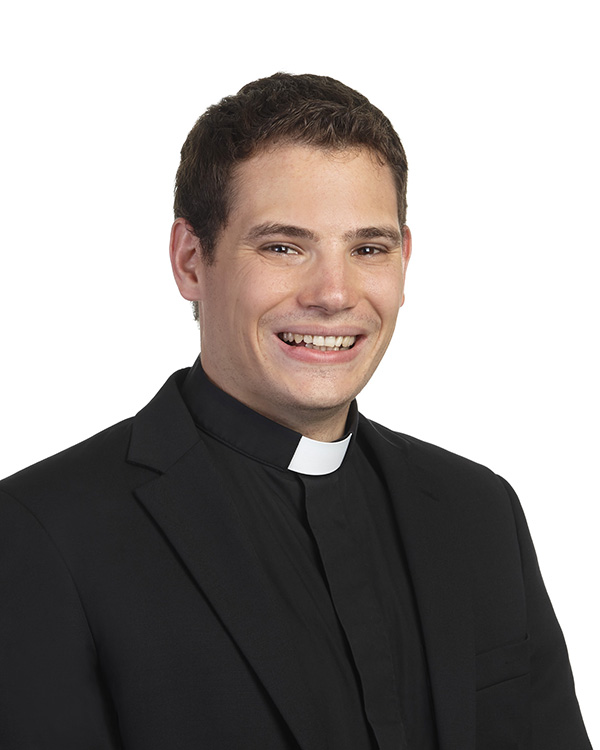The Archdiocese of Milwaukee will welcome three new priests (Dcn. Michael John Lawinger, Dcn. Michael Joseph Malucha and Dcn. Timothy Richard Schumaker) at 10:30 a.m. Saturday, May 15, at the Cathedral of St. John the Evangelist.
Dcn. Michael Lawinger
Dcn. Michael Lawinger will be the first to say that his eight years of seminary formation has been nothing like he imagined when he was a young boy contemplating the priesthood — and that’s definitely not a bad thing.
“Thank God it wasn’t what I imagined, because what I imagined wouldn’t have taught me very much,” said Dcn. Lawinger. “I think I thought the seminarians walked around like monks all day praying.”
It was at Dcn. Lawinger’s First Holy Communion at St. Anthony in Menomonee Falls that he first had thoughts of becoming a priest. “At my First Communion, I remember receiving Communion and then going to the pew to pray, and I had a really strong feeling of: I want to do what the priest is doing,” he said. “I couldn’t articulate it well at the time, but I definitely felt the tug then.”
It was always important to his parents to hand on the Catholic faith to their eight children, of whom Dcn. Lawinger is the sixth oldest. All of the Lawinger children attended the parish school, and priest friends were common visitors in the family home. “Bishop Hying was the associate pastor at St. Anthony’s when my family decided to go there, so I saw a lot of him growing up and he really gave an amazing example to me of how a priest loves and serves his people,” said Dcn. Lawinger.
His feelings of conviction grew as he got older and, in sixth grade, on the way home from Sunday Mass, he told his family that he wanted to be a priest. “The reaction was, well, great, but you’ve got a long way to wait,” he said. “My parents were always really encouraging, telling me that if this is what God wants, keep asking him and he will tell you.”
As he neared graduation from Brookfield Academy High School in 2013, thoughts of the college seminary were at the forefront of Dcn. Lawinger’s mind, but he admits to “feeling intimidated” at the prospect — he wasn’t sure he was ready to walk around all day praying, as he imagined the seminarians did. But a visit to the St. Joseph College Seminary at Loyola University in Chicago opened his eyes to the reality of seminary life.
“It’s not a bunch of people walking around like monks. You pray a lot, but it has a very different vibe and feel from what I imagined,” he said. “After visiting the college seminary, I was able to say: ‘I think I’m supposed to do this, and I can do this.’”
In college, life in the seminary brought Dcn. Lawinger to new places and experiences — many where he had never thought to encounter Christ. “In Chicago, we worked in the soup kitchens and with homeless people on the streets. In the summer, we tutored kids and did summer camps on the south side of Milwaukee,” he recalled. “As a suburban kid from outside the city, that was a big culture shock and I learned a lot from that — that this is a way in which I can encounter Christ in these people.”
Those moments of encounter continued after he entered Saint Francis de Sales Seminary in 2017. He spent time in a Spanish immersion program in Guatemala and underwent a summer of clinical pastoral education as a hospital chaplain. And at his teaching parish, St. Jerome in Oconomowoc, he learned “what a priest means to a parish.”
“My first summer at St. Jerome really saved my vocation,” he said. “It introduced me to what parish life was going to be like. This was the call I experienced. The call wasn’t to school, because even though seminary is a great way to learn how to be a priest, that’s not what we’re called to. At St. Jerome, I really experienced a love for the parish and the parish’s love for me and my vocation.”
Dcn. Lawinger’s friend and fellow seminarian, Michael Courchaine, whom he has known since eighth grade, describes him as a perceptive, intuitive individual who “has a lot of common sense, and who is really smart but doesn’t like to admit it.”
The human formation aspect of seminary, said Courchaine, was something Dcn. Lawinger “immediately fell in love with” and responded to. “How much you learn about yourself so you can be a better priest — it doesn’t come from classes, it comes from encounters you have with other people.”
As he looks forward to life after ordination, Dcn. Lawinger said he is excited to finally start the work for which he has so long prepared — to finally do, as he thought in the pew after his First Communion, “what the priest is doing.”
“I’ve been praying in seminary for my first parish for years,” he said. “Now they actually have a name, they have faces. I get to really put my life out to teach and guide these people and try to help lead them to God.”
Dcn. Michael Malucha
More than one pope has referred in church documents to the childhood family environment as being a kind of “first seminary” for a future priest. For Dcn. Michael Malucha, that was certainly the case.
Born and raised in Colgate, in the foothills of Holy Hill, Dcn. Malucha insists that his family wasn’t extraordinarily pious — “We’re a normal family; we’re certainly not floating in the Malucha household,” he said. Nevertheless, there was always a clear emphasis on the pursuit of holiness.
“From a young age, my parents taught us how to pray and the importance of the Church in our life,” said Dcn. Malucha. “They taught us that the Church is not merely an institution or a gathering of people, it’s Christ’s Body and it means something, and it’s in the Church that we receive the sacraments and the faith is handed on.”
If his early family life cultivated the infancy of a vocation, it was his experience at Marquette University High School that nurtured it to adulthood. At MUHS, said Dcn. Malucha, he experienced “a great gift — teachers who cared and the availability of daily Mass, a really good community of men whom I got to know, (and) Jesuit priests who were encouraging us to take the faith seriously and really live it.”
Choosing Marquette was just one of the moments when, looking back, Julie Malucha sees God’s hand guiding her son’s vocation. Catholic high school had not been part of their family’s plan, but they attended the MUHS open house and ran into a neighbor whose son attended, and who offered to drive Dcn. Malucha to school each day. “I always thought, ‘How would I do this — I can’t do that, I have other kids.’ She said, ‘If you come to Marquette, he’s got a ride.’ Today, I told this woman that she has a part of Michael’s formation, because so much happened for him at Marquette High. There are so many quiet little souls who had a hand in his vocation story.”
As an MUHS student, Dcn. Malucha participated in a semi-silent canoe retreat in the Canadian wilderness. The supervising priest brought along a travel-sized monstrance for Eucharistic adoration, and on an island where the group was resting for the night, Dcn. Malucha spent an early morning hour in the Lord’s presence. It was “a pivotal point for me,” he said. In that hour of adoration, he began to experience a deep desire to imitate the Lord and “to draw closer to Him.”
“That moment that was born in adoration was really when I began to discern a vocation to the priesthood,” said Dcn. Malucha.
During his senior year, he explored the process of discernment in a more proactive way, reaching out to Vocation Director Fr. Luke Strand. He applied to colleges but “my heart really wasn’t in those applications,” he said. He eventually decided to enter college seminary, and a few days after high school graduation, moved into the John Paul II House of Discernment.
Entering the seminary so young was, in Dcn. Malucha’s experience, “a singular grace,” he said.
“I have received this grace from the Lord to grow up in the Church and to follow after him and come to know him and love His Heart and the Heart of Mary in a real way,” he said. “Things that I never would have imagined happening did, precisely because I entered the seminary when I did.”
One of those things was the opportunity to study abroad in Rome, where Dcn. Malucha spent several years in formation at the Pontifical North American College. He returned to Wisconsin in March 2020, when the PNAC closed temporarily due to the COVID-19 pandemic. It was an unexpected development in Dcn. Malucha’s formation that actually became nothing less than a blessing. “Being home has been a welcome gift from the Lord,” he said.
Being back in Milwaukee has enabled him to spend more time at his teaching parish of St. Francis Borgia in Cedarburg, where he previously had only been able to serve during the summer. The witness of the community there and the parish’s dedication to initiatives like perpetual Eucharistic Adoration has been a boon to his formation, he said. “It’s a really beautiful parish and a great place to be.”
Looking forward to the priesthood, Dcn. Malucha admits to feeling “a healthy sense of fear” — but it is a blessed fear, a fear of the Lord, an overwhelming sense of awe at the recklessness of God’s generosity in the gift of one man’s vocation.
“To stand at the altar and speak a few words and, through the Holy Spirit, the Body and Blood of Christ is there, present before us — to be in the confessional and, in the name of Christ, absolve someone of their sins — to baptize someone’s child, to witness someone’s sacrament of marriage — there’s this healthy sense of fear and just awe,” said Dcn. Malucha. “Who am I to be called to the priesthood?”
Dcn. Timothy Schumaker
Dcn. Timothy Schumaker always loved to “play priest” when he was growing up, saying “Mass” and hearing his siblings’ confessions. But, he does admit to being a little rigorous when it came to penance.
“I would give them each, like, 20 rosaries,” said Dcn. Schumaker.
But future penitents who visit Fr. Schumaker’s confessional after his priestly ordination later this month can breathe easy — he is much less severe now. “That won’t continue in priesthood. I hope I’ve grown from that.”
Thoughts of the priesthood began for Dcn. Schumaker “very early on,” he said, inspired by role models like Fr. Tim Kitzke and then-Fr. Don Hying (now Bishop of Madison), family friends and priests at the parishes where the Schumakers attended.
“I had these wonderful models that I looked up to and wanted to imitate,” he said.
But it was at the Basilica of St. Josaphat, the family parish since Dcn. Schumaker was in middle school, that he became an altar server and began to experience a deeper personal love of the Mass.
“Serving really gave me a personal investment in the Mass and a personal love for the Mass at a young age,” he said. In fact, being an altar server was also an activity that helped him to maintain his spiritual life as he grew up.
“I went through the natural phase of being a high schooler — you’re beginning to question: where am I in my faith? It’s very much a family thing when you’re younger, but now I’m starting to question, do I believe all of this?” he recalled. “That’s why the Basilica was very crucial for me. I loved serving so much that going to Mass was something that I actively participated in and looked forward to. That kept the idea of the priesthood alive for me.”
After his graduation from Homestead High School in Mequon in 2013, he felt “in limbo” regarding his vocation, initially settling on a private Catholic university where he hoped he might find his calling. At the last minute, and with the guidance of his financially savvy older brother, Dcn. Schumaker decided to switch to UW-Milwaukee, where he could discern his future without racking up too much debt.
“I didn’t really know what I was going to do, but I wanted to remain connected to a faith community,” he said. He found the campus Newman Center on the very first day at UWM, attracted by the offer of a free lunch and the possibility of some fellowship with other young Catholics. It was there that he first met Vocation Director Fr. Luke Strand, who listened to his story and told him about the John Paul II House of Discernment nearby on the campus of St. Robert Parish. Dcn. Schumaker moved to the JPII House the following semester and, during Eucharistic Adoration at Cor Jesu, soon after had a pivotal experience.
“I always knew intellectually that Jesus was in the Eucharist, and I believed that, but that night it was the very first time I felt his presence in the Eucharist, that I saw him in the Eucharist,” he said. “In that moment, I just remember hearing in my heart Jesus say: ‘I want you to be a priest.’”
He applied to and was accepted at St. Joseph College Seminary at Loyola University in Chicago and, after his college graduation, entered major seminary at Saint Francis de Sales.
Seminary was often “a roller coaster,” he said, but God always found ways of “rekindling” his desire for the priesthood whenever he felt defeated.
“Every year, slowly but surely, the discernment became more and more ingrained in me and the desire for priesthood continued to grow each year,” said Dcn. Schumaker. “I would say in this past year it’s been nothing but stability, joy and excitement, and a real love for what God is calling me toward.”
Dcn. Schumaker’s friend and fellow seminarian Michael Courchain describes him as “super-energetic, friendly, kind-hearted and just one of the nicest people you’ll ever meet.”
“Dcn. Tim just has a really pastoral heart because of all those gifts,” he said. “He’s just able to reach out to anyone and make them feel immediately comfortable and able to open up to him, and just let people know that he’s there for them, that he has their back and he really genuinely cares about them.”
As a priest, Dcn. Schumaker said he is most looking forward to celebrating the sacraments — especially the Eucharist and baptism. Performing his first baptism as a transitional deacon last year, “it was at that moment I knew I was going to love this life,” he said.
He also has a great desire to minister through the sacrament of confession. “I’ve been at the receiving end of God’s mercy through confession so many times, and the thought that I can be the instrument that God uses to bring peace to people and lift some of their burdens off them is just something that I get goosebumps thinking about,” he said. “I know I’ll love to do it — without giving them 20 rosaries.”

Dcn. Michael Lawinger

Dcn. Michael Malucha

Dcn. Timothy Schumaker
